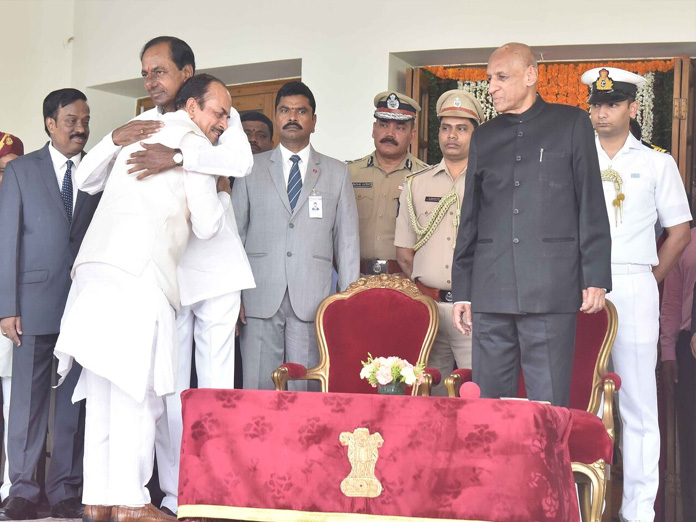Constitutional rule in TS a legal necessity

As per Article 163 of the Constitution of India, there shall be a Council of Ministers with the Chief Minister as the head to aid and advise the Governor in the exercise of his functions, except in so far as he is by or under the Constitution required to exercise his functions or any of them in his discretion
As per Article 163 of the Constitution of India, there shall be a Council of Ministers with the Chief Minister as the head to aid and advise the Governor in the exercise of his functions, except in so far as he is by or under the Constitution required to exercise his functions or any of them in his discretion.
This explains that when the Governor is bound to act on his own as per the norms established, he must run the State only on the advice of the Council of Ministers, which is generally called Cabinet, though only those senior Ministers designated as Cabinet ministers constitute the ‘Cabinet’.
The Governor has certain discretionary powers in some specific circumstances, for instance, when a minority government recommends for dissolution of Legislative Assembly or inviting a leader to form government when the people do not give majority to a single party. The Constitution ensures no concentration of power in any individual, neither the Governor nor the Chief Minister.
It is not advice of the Chief Minister, that is prescribed. It is that of Council of Ministers. Though the Chief Minister takes decisions and dominates the Cabinet, he is not the whole and sole of the government. He must discuss the issues in the Council of Ministers. This means the real power has been distributed among the members of the Council of Ministers. The resolution of that Council becomes the advice to the Governor.
The Governor is dutybound to follow the advice of the Council of Ministers conveyed through the Chief Minister etc, if the advice is Constitutionally valid. Both the Chief Minister and the Governor take oath to act according to the Constitution of India, which cannot be forgotten. Though the Constitution of India gave exhaustive guidance as to the functioning in power, certain gaps are bound to occur which need to be filled as per the Constitutional scheme or Constitutional morality reflecting in conventions or practices. Hence, there shall be a Cabinet.
In Telangana, a piquant situation arose with the Chief Minister, along with a Minister, is in place of ‘Council of Ministers’. There is no prescription of number for constituting a Cabinet. But one cannot assume a single person as Cabinet. Then the question whether two constitute a Council? Certainly not. There is a need for constituting a full-fledged Cabinet. We cannot even say that Cabinet should be expanded. It must be constituted in full form. It is Constitutional necessity.
Then came up an issue. The model code of conduct being in vogue due to gram panchayat elections, media reported quoting some officers that the Assembly was unlikely to convene this month and hence MLA-elects could not be administered their oaths, Ministers could not be appointed etc. They quoted ‘sources within the State Election Commission that the Cabinet expansion, if done before polls, could influence voters. SEC permission would be required to convene the Assembly session as well. Very strange indeed. If SEC permits, the inclusion of leaders into the Cabinet will not influence the voters, if it does not permit, it will!
Can they restrict Constitutional obligations such as the formation and expansion of Cabinet and summoning session of the Legislative Assembly? They also said that the transfer of IAS and IPS officers, another key function of a newly-elected government, cannot be taken up either. Does it mean that the total Constitutional governance should come to grinding halt, because of elections?
Media also quoted State ‘sources’ saying that the SEC has no business in these matters. Such ‘source’ asked: “When the Election Commission of India cannot stop the government from expanding a Cabinet or summon legislature, how can the SEC stop us”.
Telangana Legislative Assembly session must be summoned, new legislators shall take oath of office, the budget or vote on account must be discussed. Cabinet ministers should take over the administration of the concerned departments. Will routine administration also influence the voters?
It is also reported that the officials had been directed not to stop the distribution of Rythu Bandhu cheques even though the MCC is in. It is not a new scheme devised to attract voters now in Telangana. Old scheme-based benefits like pensions etc need not be stopped.
Model code of conduct, that is framed and notified under Article 243-K of the Constitution of India, at both national and State levels, says that an ad hoc appointment which influences the polls cannot be made. It means that any ad hoc appointment which might influence the minds of the voters should not be made. Constituting the Cabinet with more members will not have any impact on the minds of the people to orient them to vote in panchayat elections. What kind of an adverse influence it can have on voters?
Distribution of power is essential. It should not be concentrated in one single person. When it is being distributed among the elected members of the ruling party, one should welcome it. However, the Ministers should not make fresh sanctions and fresh promises, that might influence the voters. In fact, people can criticise the newly-elected party for not forming a full-fledged Cabinet.
It appears there is a need for proper and comprehensive training of the officers and employees of the Constitutional institutions like Election Commission, both at States and Centre and administrative officers.

